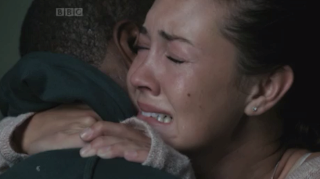 |
| Love's young nightmare: Michelle and Paul struggled with parenthood |
The series trails a quintet of Margate love lives, with each night’s characters being loosely but artfully intertwined as they go about their amorous business in the quaint seaside town. Stifle that yawning judgement for a minute, though; the sequence prides itself on being totally improvised drama, and this gives it some real clout. Episode two’s spotlight shone on twenty-something Paul and his apathy towards his doldrum lifestyle as a newly married father. Paul’s character, at the outset, was nigh on impossible to sympathize with; the opening scene underlined his toddler-like moodiness as wife Michelle tended adoringly to their child, and his skulking out of their seafront flat smacked of juvenility. Paul’s early case wasn’t aided by the longing and lingering glance he bestowed on a bit-of-rough blonde as he cruised past her bus stop. For a central character, it was a risky strategy to hand Paul’s wandering eye and lack of domestic contentment priority in the storyline’s progression, and one that looked astronomically unlikely to pay off. Indeed, the hostility viewers couldn't help but harbor towards him even marred the improvisational USP of the series; every time he stammered I found myself lambasting his inarticulacy rather than praising the authenticity of director Savage’s style. During his first showdown with Michelle, Paul hurled cliched digs and jibes (“Is this, like, a joke to you?” “What’s wrong with you”) that could (should?) have prompted recognition for their naturalness, but instead hardened aversion to their utterer.
 |
| A man of two halves: Paul proved to be stunningly complex |
At the midway point of the show, though, Paul proved himself quite the Jekyll/Hyde. I’m talking about a transformation that would stun the PR team responsible for Cheryl’s move from nightclub-attendant puncher to blushing belle. After a spot of typically crude flirting and a stolen moment of passion, Paul’s more sensitive side got a thoroughly good airing when he found himself in love with aforementioned bus-passenger Stella. One scene witnessed the pair strolling along a windswept Margate seafront, another featured them dancing amorously in a dimmed beachside bar (who needs Danny and Sandy’s with this pair?). Here, it was less bothersome to understand and appreciate Paul’s discontentment at home; he was not, evidently, recklessly and restlessly craving physical intimacy, but instead desperate for someone to be receptive to his romantic soft side. In fact, for the episode’s climax story-liners went one further and made Paul pitifully vulnerable; he readily loaned Stella his savings when she told him her mum was in over her head financially and subsequently had his heart and bank balance bled dry. Any producer/actor duo that can cultivate a character this deep and this able to stun audiences deserves credit, but to do so with a character who initially evokes such viewer-enmity is doubly difficult: kudos.
Michelle’s bit as the downtrodden and selfless young wife was, naturally, more apt at winning viewer support, but Lacey Turner still had her work cut out. This being Paul’s episode it was all too feasible that Michelle would occupy the half hour’s “plant pot” role-unoffensive but in an irritatingly muted, prop-ish sort of sense. Especially in those thorny premature minutes when Paul was riling up viewers, however, Lacey did a stellar job of underscoring that all-important improvisational element. When Paul bullishly confronted her about her coldness, Michelle jabbered “um lamb, I’ve got lamb, some chicken breast,” and when he crawled into their marital bed post-his first steamy rendezvous with Stella, her “is everything alright?” came off as believable, endearing and unforced. As the episode drew to an end, Michelle’s inclusion stood as testament to the subtlety and multiplicity of the series’ construction. When she begged a bag-packing Paul, “please don’t go”, it hit hard that, even as one supporting, this was a character with the potential to be every inch as intricate and insecure as her spotlight-hogging husband. Indeed, this was the time that the improv factor aided character development, rather than solid acting making the unscripted-ness a possibility; Michelle’s despair and dependence were made manifest by her lack of dramatic and cliched expressiveness. The couple's played-down staying together, too, rammed home the message that drama needn't be ostentatious or aggressive in its communication; the subtlety achieved a poignancy that escapes the overwhelming bulk of love-driven series upon series.
 |
| Everybody hurts...all the time? Michelle took a non-stop bashing |
Glaringly, this episode’s pitfall was its uninterrupted bleakness. By focusing so intently on achieving nakedness and credibility producers seemed to marginally overlook any hint of light heartedness. Even Paul’s comparably frivolous time with Stella was undercut by shots of him guiltily lying to his wife or beginning another day as a run-down carpet salesman. A happily ever after, granted, might have contradicted the series’ emphasis on the ironic misery that love goes hand in hand with, but would a seldom joke be too much to ask? A few scattered giggles? True, woe does crop up in life, but so too does pleasure; to scale even higher peaks of verisimilitude one might have hoped Savage would chuck in the odd gag here and there.
At the crux of it, “True Love”, from what I saw Monday, deserves a place amongst the creme-de-la-creme of telly drama for its being a series that consistently, even excruciatingly, mirrors the hardships of the average-Joe’s love life. The series’ accomplishments are made even more commendable by the baring in mind the discrete but labyrinthine connections between each nights’ characters (Michelle’s sister, in a spectacular strike of forethought, donned the other-woman mask on Tuesday evening). And if the other handful of episodes are as bungled and dry as Sunday’s was being so heavily blasted for being? Just work on that selective memory.

No comments:
Post a Comment